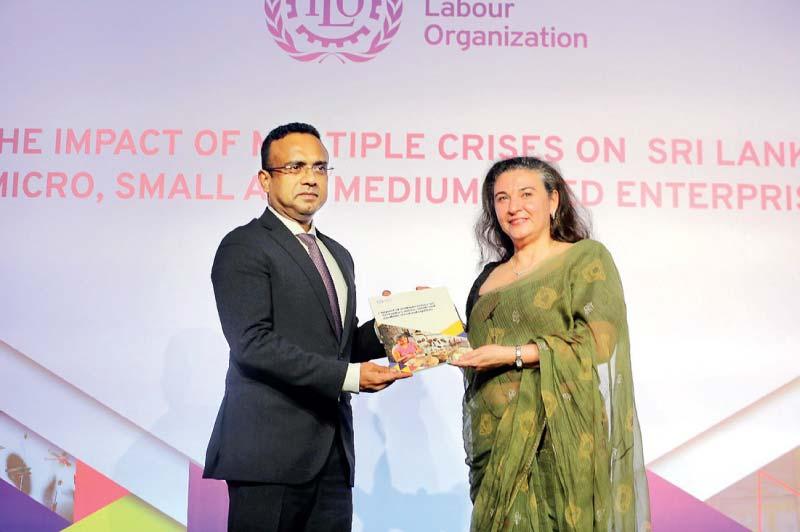Reply To:
Name - Reply Comment

ILO Country Director for Sri Lanka and the Maldives Simrin Singh (right) hands over a copy of the new report to Labour and Foreign Employment Minister Manusha Nanayakkara
Sri Lanka’s failure to address the impediments to enterprise growth that had been rigorously identified at least 20 years ago has hampered the healthy growth of enterprises, leaving them vulnerable to the kind of cataclysmic shocks that have rocked the economy since 2019, the International Labour Organisation (ILO) said.
An assessment by the ILO on the ‘Impact of multiple crises on Sri Lanka’s micro, small and medium-sized enterprises (MSMEs)’ identified several risk factors that the MSMEs experienced during the crises as well as the impediments to their continued survival, recovery and growth in the future.
“Many of these constraints are the same as those identified several decades ago, such as the high cost of energy, uncertain macroeconomic environment and cost of and access to finance,” the ILO said in its recently launched report.
To rectify the long-standing issues, in the immediate present and medium term, Sri Lanka needs to address these long-identified constraints on enterprise growth. Efforts are necessary to build agile, resilient and adaptive entrepreneurship development systems that can help prepare for and respond to the current economic crisis and future shocks, the ILO pointed out.
According to the agency, Sri Lanka can use the crisis to reset its development model and work towards resilient and job-rich growth.
“With stabilisation largely achieved, Sri Lanka needs to initiate serious reforms that address these constraints consistently and in a sustained manner,” it said.
The ILO noted that trust in public institutions also must be rebuilt through good governance, greater transparency and accountability. Further, a policy framework that protects and promotes MSMEs that have over the years taken multiple hits from institutional and policy failures is urgently needed.
The multiple crises Sri Lanka has faced, combined with the recent economic stabilisation measures, have had an impact on jobs and earnings in a labour market long constrained by skill deficits, widespread informality, youth unemployment and women’s weak workforce engagement.
ILO Country Director for Sri Lanka and the Maldives Simrin Singh asserted that more than ever, the convergence of crises and associated uncertainties are fuelling inequalities.
“Beyond the human toll the crises have caused, they also show the deep interlinkages and dependencies their impact has on the world of work.
This also shows the crucial need for concerted, coordinated action at all levels without delay,” she said in her message. (SAA)